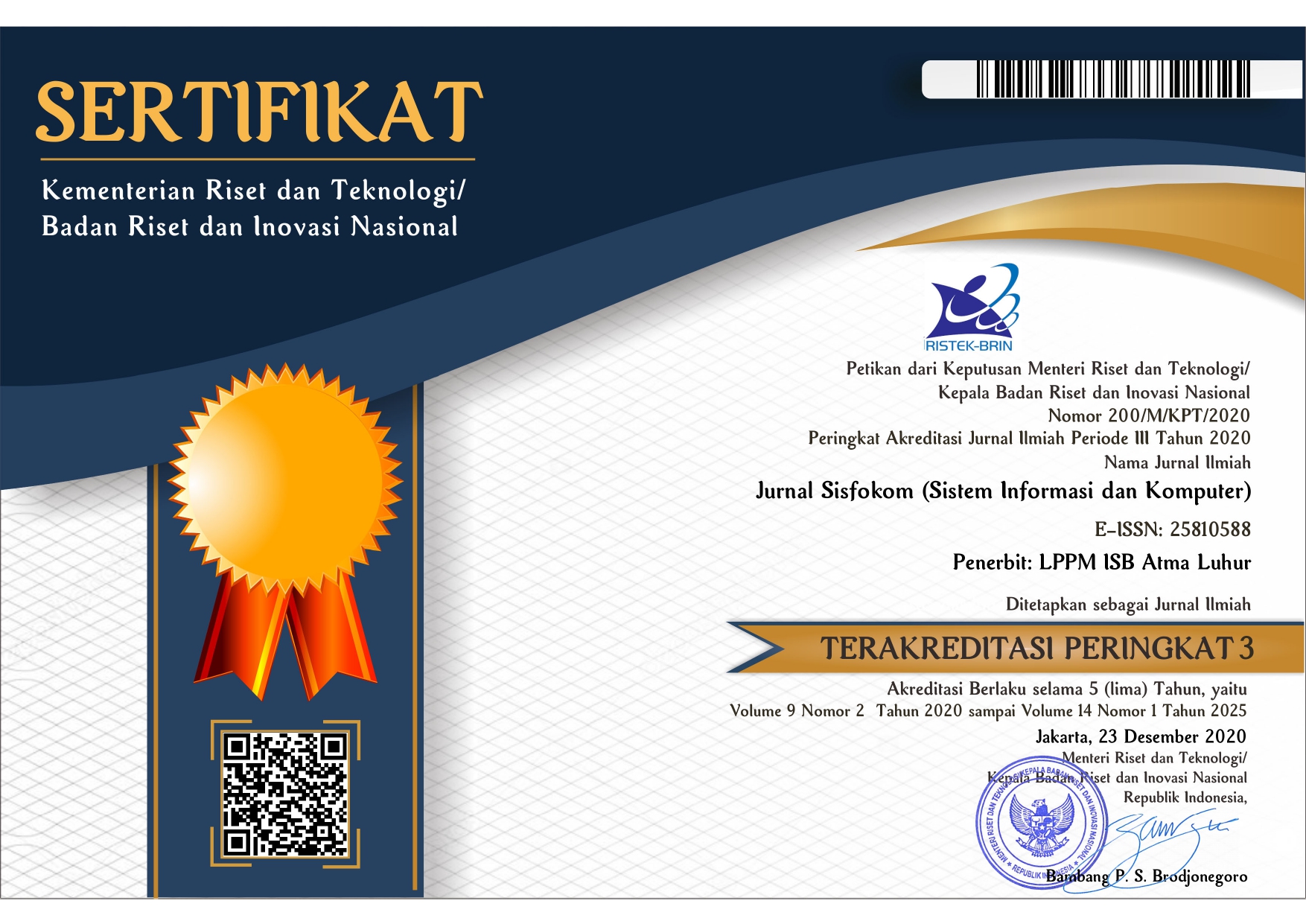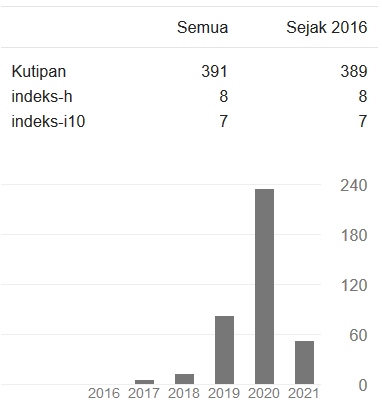Portabel Intrusion Prevention System Untuk Mengamankan Koneksi Internet Saat Menggunakan WiFi Publik
DOI:
https://doi.org/10.32736/sisfokom.v11i1.1223Keywords:
Portabel IPS, Raspberry Pi, SuricataAbstract
Saat ini hampir semua tempat umum menyediakan fasilitas Wireless Fidelity (WiFi) publik. Pengguna yang terkoneksi melalui fasilitas tersebut terkadang sering abai terhadap faktor keamanan data dan jaringan, yang terpenting bagi mereka adalah dapat menikmati akses internet secara gratis. Dari sisi keamanan WiFi publik cukup rentan karena jaringan ini bisa saja dipergunakan oleh pihak-pihak yang kurang bertanggung jawab untuk mengambil data penting dari para penggunanya, karena dari segi akses tidak ada pembatasan. Tujuan dari penelitian ini adalah untuk mengembangkan sistem yang berfungsi sebagai router gateway dan sistem yang mampu mencegah terhadap upaya serangan yang berjalan pada perangkat mini komputer. Penelitian ini menggunakan metode Intrusion Prevention System (IPS), dimana sistem ini mampu mendeteksi sekaligus melakukan pencegahan adanya serangan. Dari hasil penelitian diperoleh bahwa portabel IPS telah berhasil dikembangkan dengan menggunakan Raspberry Pi 4 Model B dilengkapi dengan LCD TFT 3,50 inch dan catu daya dengan kapasitas 10.000 mAh serta Suricata yang dikonfigurasi sebagai IPS. Serangan berupa port scanning menggunakan aplikasi zenmap berhasil dideteksi oleh portabel IPS. Selain berfungsi sebagai IPS perangkat ini mampu menjadi router gateway. Catu daya portabel IPS mampu bertahan selama 34611,22 detik dengan sebuah smartphone sebagai client.References
M. Roesch and The Snort Team, “Snort 3 User Manual,” pp. 1–312, 2018, [Online]. Available: https://snort-org-site.s3.amazonaws.com/production/release_files/files/000/008/468/original/snort_manual.pdf?X-Amz-Algorithm=AWS4-HMAC-SHA256&X-Amz-Credential=AKIAIXACIED2SPMSC7GA%2F20190421%2Fus-east-1%2Fs3%2Faws4_request&X-Amz-Date=20190421T232324Z&X-Am.
“Suricata User Guide — Suricata 6.0.3 documentation.” https://suricata.readthedocs.io/en/suricata-6.0.3/ (accessed Jul. 30, 2021).
Parag Vadher, “Snort IDPS using Raspberry Pi 4,” Int. J. Eng. Res., vol. V9, no. 07, pp. 151–154, 2020, doi: 10.17577/ijertv9is070099.
T. Zitta, M. Neruda, and L. Vojtech, “The security of RFID readers with IDS/IPS solution using Raspberry Pi,” 2017 18th Int. Carpathian Control Conf. ICCC 2017, pp. 316–320, 2017, doi: 10.1109/CarpathianCC.2017.7970418.
“Buy a Raspberry Pi 4 Model B – Raspberry Pi.” https://www.raspberrypi.org/products/raspberry-pi-4-model-b/?resellerType=education (accessed Jul. 31, 2021).
A. D. Putra, W. Yahya, and A. Bhawiyuga, “Analisis Kinerja Dan Konsumsi Sumber Daya Aplikasi Web Server Pada Platform Raspberry Pi,” J. Pengemb. Teknol. Inf. dan Ilmu Komput., vol. 3, no. 4, pp. 3513–3521, 2019.
D. Prihatmoko, “Pemanfaatan Raspberry Pi Sebagai Server Web Untuk Penjadwalan Kontrol Lampu Jarak Jauh,” J. Infotel, vol. 9, no. 1, p. 84, 2017, doi: 10.20895/infotel.v9i1.159.
O. Karahan and B. Kaya, “Raspberry Pi Firewall and Intrusion Detection System,” J. Intell. Syst. Theory Appl., vol. 3, no. 2, pp. 21–24, 2020, doi: 10.38016/jista.653486.
S. Tripathi and R. Kumar, “Raspberry Pi as an Intrusion Detection System, a Honeypot and a Packet Analyzer,” Proc. Int. Conf. Comput. Tech. Electron. Mech. Syst. CTEMS 2018, pp. 80–85, 2018, doi: 10.1109/CTEMS.2018.8769135.
Y. P. Atmojo, “Analisa Performa Raspberry Pi sebagai Intrusion Detection System: Studi Kasus IDS Pada Server Web,” Eksplora Inform., vol. 8, no. 1, p. 24, 2018, doi: 10.30864/eksplora.v8i1.143.
“GitHub - idev1/rpihotspot: Raspberry Pi - Hotspot (Access Point and WiFi Client/Station).” https://github.com/idev1/rpihotspot (accessed Jul. 30, 2021).
“Welcome to RPi-Monitor documentation ! — RPi-Monitor v2.13-r0.” https://xavierberger.github.io/RPi-Monitor-docs/index.html (accessed Jul. 31, 2021).
“Proofpoint Emerging Threats Rules.” https://rules.emergingthreats.net/open/suricata-5.0/rules/ (accessed Aug. 02, 2021).
Downloads
Published
Issue
Section
License
The copyright of the article that accepted for publication shall be assigned to Jurnal Sisfokom (Sistem Informasi dan Komputer) and LPPM ISB Atma Luhur as the publisher of the journal. Copyright includes the right to reproduce and deliver the article in all form and media, including reprints, photographs, microfilms, and any other similar reproductions, as well as translations.
Jurnal Sisfokom (Sistem Informasi dan Komputer), LPPM ISB Atma Luhur, and the Editors make every effort to ensure that no wrong or misleading data, opinions or statements be published in the journal. In any way, the contents of the articles and advertisements published in Jurnal Sisfokom (Sistem Informasi dan Komputer) are the sole and exclusive responsibility of their respective authors.
Jurnal Sisfokom (Sistem Informasi dan Komputer) has full publishing rights to the published articles. Authors are allowed to distribute articles that have been published by sharing the link or DOI of the article. Authors are allowed to use their articles for legal purposes deemed necessary without the written permission of the journal with the initial publication notification from the Jurnal Sisfokom (Sistem Informasi dan Komputer).
The Copyright Transfer Form can be downloaded [Copyright Transfer Form Jurnal Sisfokom (Sistem Informasi dan Komputer).
This agreement is to be signed by at least one of the authors who have obtained the assent of the co-author(s). After submission of this agreement signed by the corresponding author, changes of authorship or in the order of the authors listed will not be accepted. The copyright form should be signed originally, and send it to the Editorial in the form of scanned document to sisfokom@atmaluhur.ac.id.









